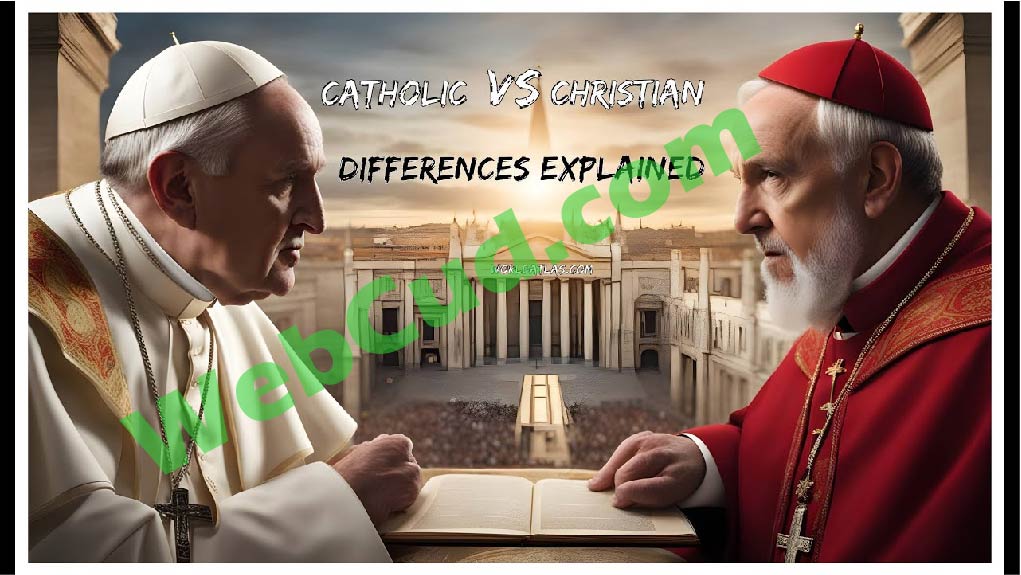In this blog! We inform you what is the difference between Christian and catholic. Christianity is a broad religion with many branches and denominations, among which Catholicism is one. Here is a detailed table outlining the differences between general Christians and Catholics:
| Aspect | Christian | Catholic |
|---|---|---|
| Definition | Followers of Jesus Christ, encompassing all denominations | A major branch of Christianity with specific beliefs and practices |
| Branches | Includes various denominations like Protestantism, Orthodoxy, and others | Specific branch within Christianity, known as the Roman Catholic Church |
| Authority | Bible is the sole or primary authority (Sola Scriptura in Protestantism) | Bible and Sacred Tradition, with the Pope as the highest earthly authority |
| Leadership | Varies by denomination; no single human leader | Led by the Pope, bishops, and priests in a hierarchical structure |
| Sacraments | Varies by denomination; typically includes Baptism and Communion | Seven sacraments: Baptism, Eucharist, Confirmation, Reconciliation, Anointing of the Sick, Matrimony, Holy Orders |
| View of Mary | Respect and honor as the mother of Jesus; varies by denomination | Deep veneration; belief in the Immaculate Conception and Assumption |
| Saints | Respected as historical figures and role models; varies by denomination | Saints are venerated; believed to intercede with God on behalf of the faithful |
| Salvation | By faith alone (Sola Fide) in many Protestant branches; varies by denomination | Faith and works together; adherence to sacraments and church teachings |
| Worship Services | Varies widely; often includes preaching, singing, and Bible reading | Highly structured liturgy; central focus on the Eucharist (Mass) |
| Scripture | Bible is the sole or primary religious text | Bible (including Deuterocanonical books) and additional church teachings and traditions |
| Church Structure | Varies by denomination; often congregational or synodal | Hierarchical; led by the Pope, cardinals, bishops, and priests |
| Religious Practices | Varies widely by denomination; often includes Bible study, prayer, and communal worship | Includes attending Mass, receiving sacraments, praying the Rosary, and observing holy days |
| Role of Tradition | Varies by denomination; some rely solely on the Bible | Sacred Tradition is as important as the Bible for doctrine and practice |
| Holy Days | Christmas, Easter, and other denominationally specific days | Includes all Christian holy days plus specific Catholic observances like Feast of the Immaculate Conception, Feast of Assumption, etc. |
| Confession | Direct prayer to God for forgiveness (in many Protestant branches) | Confession to a priest is a sacrament (Reconciliation) |
What is the Difference Between Christian and Catholic Detailed Explanations
- Definition:
- Christian: A broad term that includes anyone who follows Jesus Christ, encompassing many denominations such as Protestantism, Orthodoxy, and others.
- Catholic: A specific branch within Christianity, known as the Roman Catholic Church, with particular beliefs and practices.
- Branches:
- Christian: Includes various denominations like Protestantism, Orthodoxy, Anglicanism, and others.
- Catholic: The Roman Catholic Church is a distinct branch of Christianity.
- Authority:
- Christian: Many denominations, especially Protestant, hold the Bible as the sole or primary authority (Sola Scriptura).
- Catholic: The Bible and Sacred Tradition are both authoritative, with the Pope as the highest earthly authority.
- Leadership:
- Christian: Leadership varies by denomination; no single human leader for all Christians.
- Catholic: Led by the Pope, with a hierarchical structure that includes cardinals, bishops, and priests.
- Sacraments:
- Christian: Number and nature of sacraments vary by denomination; often includes Baptism and Communion.
- Catholic: Recognizes seven sacraments: Baptism, Eucharist, Confirmation, Reconciliation, Anointing of the Sick, Matrimony, and Holy Orders.
- View of Mary:
- Christian: Mary is respected and honored as the mother of Jesus; beliefs about her vary by denomination.
- Catholic: Mary is deeply venerated; beliefs include the Immaculate Conception (Mary was conceived without original sin) and the Assumption (Mary was taken up into heaven).
- Saints:
- Christian: Saints are respected as historical figures and role models; veneration varies by denomination.
- Catholic: Saints are venerated and believed to intercede with God on behalf of the faithful.
- Salvation:
- Christian: Many Protestant branches believe in salvation by faith alone (Sola Fide); views on salvation vary by denomination.
- Catholic: Believes that faith and works together contribute to salvation; adherence to sacraments and church teachings is essential.
- Worship Services:
- Christian: Services vary widely; often include preaching, singing, and Bible reading.
- Catholic: Highly structured liturgy with a central focus on the Eucharist (Mass).
- Scripture:
- Christian: The Bible is the sole or primary religious text.
- Catholic: The Bible (including Deuterocanonical books) and additional church teachings and traditions.
- Church Structure:
- Christian: Structure varies by denomination; often congregational or synodal.
- Catholic: Hierarchical structure led by the Pope, with cardinals, bishops, and priests.
- Religious Practices:
- Christian: Practices vary widely; often include Bible study, prayer, and communal worship.
- Catholic: Includes attending Mass, receiving sacraments, praying the Rosary, and observing holy days.
- Role of Tradition:
- Christian: Varies by denomination; some rely solely on the Bible.
- Catholic: Sacred Tradition is as important as the Bible for doctrine and practice.
- Holy Days:
- Christian: Observes Christmas, Easter, and other denominationally specific days.
- Catholic: Observes all Christian holy days plus specific Catholic observances like the Feast of the Immaculate Conception, Feast of the Assumption, etc.
- Confession:
- Christian: Many Protestant branches practice direct prayer to God for forgiveness.
- Catholic: Confession to a priest is a sacrament known as Reconciliation.
Understanding these differences can help clarify the diverse practices and beliefs within Christianity, and how Catholicism fits into the broader Christian tradition.

